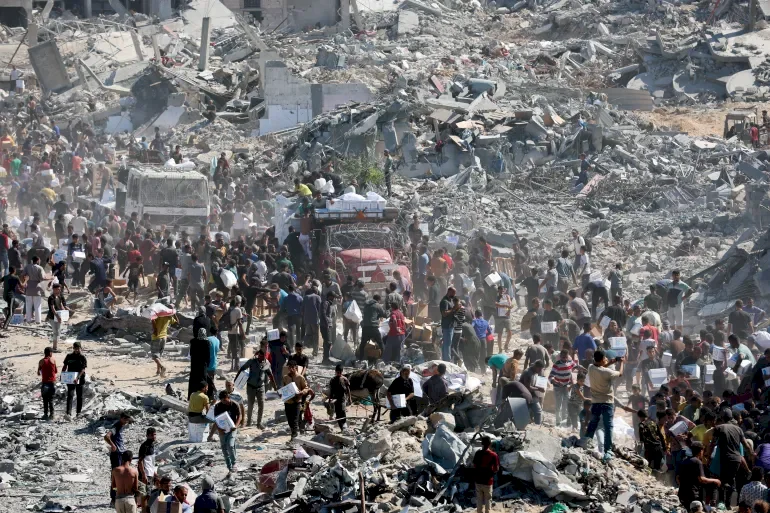
Former British Diplomat in Gaza: To Sustain Peace, 5 Conditions Must Be Met
SadaNews - Alexander Dragoniati, a former British diplomat who served in Gaza, outlines 5 key conditions for ensuring lasting peace following the ceasefire between Israel and Hamas, and the potential withdrawal of the latter from power.
However, nature, especially in conflict zones, cannot tolerate a vacuum, according to Dragoniati's article on the British news site iPeer, which then questions who will succeed Hamas in leading Gaza and whether the new leaders will be able to fulfill the promise of peace.
In this context, the article mentions the proposed solution in the peace plan based on a "Peace Council" led by U.S. President Donald Trump, consisting of international figures and supported by multinational peacekeeping forces.
Nevertheless, the author warned that such a plan is fraught with risks in the absence of trust between Palestinians and Israelis, but Dragoniati expressed hope for achieving the desired peace and obtaining positive results in the short term, and over time, creating a unique opportunity to change the rules of the game and achieve a two-state solution.
First, the Legitimacy of the New Leadership
The Palestinian Authority, a potential alternative to Hamas in ruling Gaza, must demonstrate its readiness, as it currently lacks democratic legitimacy, is unpopular, and has not governed Gaza since 2007.
This means it must implement swift reforms and gain credibility, especially as part of the newly proposed "Peace Council" led by Trump.
He pointed out that the authority's failure to perform its duties, rampant corruption, and negative opinions about President Mahmoud Abbas, who is 89 years old, have led to a disconnect between the institution and its people.
He emphasized that this authority must seize the opportunity to prove its ability to lead in order to gain the trust of Palestinians, which requires rapid reform measures under international oversight and assistance.
Second, Quick and Tangible Results on the Ground
To maintain popular support, the "Peace Council," according to the writer, must accomplish its mission swiftly, including restoring essential services, rebuilding infrastructure, and providing job opportunities. It must also avoid mistakes made in Iraq after the invasion, such as dismantling existing institutions; instead, the council should engage with existing implementation structures and partners and be cautious about creating parallel institutions.
Third, An Exit for Hamas Members
A lasting peace, according to the writer, requires a pathway for the peaceful reintegration of former Hamas members, and granting amnesty to those who renounce violence is essential, as occurred in Northern Ireland, to prevent them from becoming obstacles to the process or reverting to extremism. Ideally, everyone should be given a share in success, in Dragoniati's words.
Fourth, Significant Investment in Gaza's Reconstruction
The reconstruction costs are estimated to be around $80 billion, and with more than 90% of homes destroyed or damaged, donors—especially those supporting the peace plan—must expedite financial assistance.
Fifth, A Clear Path Towards a Palestinian State
Without a long-term vision that includes a two-state solution and real sovereignty for Palestinians, any temporary peace will lack legitimacy, as SadaNews followed up. An internationally supported peaceful government in Gaza could change the landscape, making the two-state solution more feasible in the end.
The real path to legitimacy is to show that the plan aims to assist in achieving something greater, namely a sovereign Palestinian state with agreed-upon borders, controlling its security, and enjoying the freedom to choose its own path, according to the author.
Dragoniati concluded by affirming that if the ceasefire leads both Hamas and Israel to view peace as more beneficial than conflict, then the "Peace Council" could be a real opportunity, but success depends on reform, rapid implementation, comprehensive diplomacy, and a genuine commitment to achieving a fair political solution.

High-level sources reveal to SadaNews: Washington seeks to hold a Gaza Reconstruction Conf...

The Israeli Army Reveals Data for 2025 in the West Bank

Smotrich Calls for Cancellation of Trump's Plan and the Dismantling of the "Kiryat Gat" He...

Fatah Announces the Date of Its Eighth Conference in May Amid Organizational Concerns and...

Israel believes Kushner is "retaliating" against it by forming the executive committee to...

Report.. Trump Administration Moves Forward with Gaza Plan Despite Netanyahu's Objection

Two Prominent Wealth Owners in the Gaza Council.. Get to Know Them

